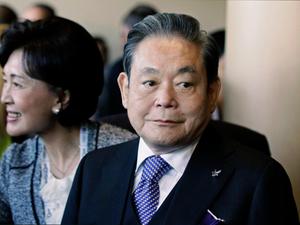Lee Kun-hee, who transformed Samsung Electronics from a copycat South Korean appliance maker into the world’s biggest producer of smartphones, televisions and memory chips, has died. He was 78.
Lee passed away on Sunday with his family by his side, the company said in a statement, without mentioning the cause of death. His family will hold a private funeral. He had surgery in 2014 after a heart attack and was treated for lung cancer in the late 1990s.
Lee, who told employees to “change everything except your wife and children” during his drive to foster innovation and challenge rivals such as Sony, was South Korea’s richest person. He had an estimated net worth of $20.7 billion.
Samsung, the biggest of South Korea’s family-run industrial groups, known as chaebol, has been led by his only son since the heart attack.
“Chairman Lee was a true visionary who transformed Samsung into the world-leading innovator and industrial powerhouse from a local business,” the company said. “His legacy will be everlasting.”
The reins are now set to pass to his only son Jay Y. Lee, who’s been the conglomerate’s de facto leader since his father’s hospitalisation in 2014. Lee is expected to eventually inherit a $300bn company that’s riding a Covid-era boom in online activity.
Samsung, the maker of the Galaxy line of smartphones, also supplies semiconductors for Google’s data centers and Apple’s iPhone. It’s the world’s most advanced maker of displays for TVs, computers and mobile devices.
The younger Lee is currently grappling with two simultaneous legal disputes with South Korean prosecutors over allegations of bribery and corruption, which he’s repeatedly denied.
It was Lee Kun-Hee who built the company into the electronics powerhouse of today, becoming synonymous with the rise of South Korea on a global economic stage.
Named one of the world’s 100 most influential people by Time magazine in 2005, Mr Lee began overhauling Samsung Electronics after he saw the company’s products gathering dust in a Los Angeles electronics store, according to “The Lee Kun Hee Story,” a 2010 biography by Lee Kyung-sik.




